
1. 3rd Quarter
1.1. Types of reactions
1.1.1. Synthesis
1.1.1.1. A+B=AB
1.1.2. Decomposition
1.1.2.1. the state or process of rotting; decay.
1.1.3. combustion
1.1.3.1. the process of burning something.
1.1.4. Single Replacement
1.1.4.1. a type of oxidation-reduction chemical reaction when an element or ion moves out of one compound and into another
1.1.5. Double Replacements
1.1.5.1. a type of reaction that occurs when the cations and anions switch between two reactants to form new products.
1.1.6. Acid/Base Reactions
1.1.6.1. a type of chemical process typified by the exchange of one or more hydrogen ions, H +, between species that may be neutral (molecules, such as water, H 2O; or acetic acid, CH 3CO 2H) or electrically charged (ions, such as ammonium, NH 4 +; hydroxide, OH −; or carbonate, CO 3 2-).
1.1.7. Redox reactions
1.1.7.1. a type of chemical reaction that involves a transfer of electrons between two species.
1.1.8. Endothermic Reactions
1.1.8.1. The term endothermic process describes a process or reaction in which the system absorbs energy from its surroundings; usually, but not always, in the form of heat.
1.1.9. Exothermic Reactions
1.1.9.1. An exothermic reaction is a chemical reaction that releases energy by light or heat. It is the opposite of an endothermic reaction. Expressed in a chemical equation: reactants → products + energy.
2. 2nd Quarter
2.1. Circuits
2.1.1. Definition: a roughly circular line, route, or movement that starts and finishes at the same place.
3. 1st Quarter
3.1. Newton's laws
3.1.1. 1. Newton's First Law states that an object will remain at rest or in uniform motion in a straight line unless acted upon by an external force.
3.1.2. 2. Newton's second law of motion pertains to the behavior of objects for which all existing forces are not balanced.
3.1.3. 3. For every action, there is an equal and opposite reaction.
3.2. Motion
3.2.1. "the action or process of moving or being moved."
3.3. Doppler shift
3.3.1. The Doppler effect (or Doppler shift) is the change in frequency of a wave (or other periodic event) for an observer moving relative to its source.

